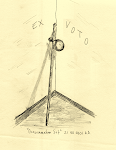“By you Saracens were destroyed,
Unbelievers to death envoyed,
Christian law by you hegemony obtained
Praise God, glorious fame I by you attained”
Unbelievers to death envoyed,
Christian law by you hegemony obtained
Praise God, glorious fame I by you attained”
---Roland to Durandal, Pseudo-Turpin
Roncesvalles is a town of legend and a town of history. It catapults the pilgrim into days of yore, when Charlemagen ruled much of Europe. It introduces the pilgrim to the Reconquista, the Spanish reconquest of the Hispanic peninsula from the Moor.
It was hereabouts in 778 where the epic Battle of Roncesvalles occurred. The enemy of the Franks, informed by the treason of the turncoat Frank, Ganelon, rushed down from the mount of Astobizcar with fury and ambushed Roland and Charlemagne’s rearguard and baggage train. Both the Pseudo-Turpin and the famous Song of Roland make the Saracen the enemy; but historians tell us the enemy was the Basque. The Basques’ hearts were fired with vengeance against Charlemagne because of his burning of Pamplona. Roland fought, and fought well, but the enemy was strong and had the advantage of surprise. The battle lost, he blew his horn the oliphant much, stubbornly much too late. Charlemagne and the bulk of the Frankish army were resting in Valcarlos when the oliphant sounded. Charlemagne, deceived and delayed by Ganelon’s malice, was too far away to render any aid but embalming and Requiem Masses when he responded.
Here it was that Roland, in his death throes, praised Durandal, the sword that had given him victory and brought him fame:
| O gladius pulcherrimus Non more furdibus Sed semper lucidissimus Longitudine decentissimus Latitudine congruus Fortitudine firmus Manutenente eburneo candissimus Cruce aure splendissimus Superficie deauratus Pommo berillino decoratus Litteris carissimus Magno nomine Dei, A Ω sculptus Acumine legitimus Dei virtute circundatus. | O sword of beautiful delight Never stained to the sight But always polished bright Of most perfect length And proportionate width And dependable strength With whitest ivory hilt With a gold cross guilt Of burnished, golden hue And pommel of beryl true Sculpt with God’s great name A Ω, letters of God’s acclaim Of point sharp, and tried, and true God’s power always surrounded you. |
Roland thrice tried without success to break his fabled sword, in despair hiding it and the precious relics in its hilt to keep it from the enemy.
The legendary Roland was Christian—before battle he had confessed and taken the Eucharist—and his final thoughts turned to the consideration and contemplation of his sin, and of the Lord’s quality always to have mercy.
Domine Ihesu Christe . . . ultra quam dici fas est me reum et peccatorem esse confiteor, sed tu, qui omnium peccatorum indultor clementissimus es, quique misereris omnium et nichil odisti ea quae fecisti, dissimulans peccata hominum ad te revertencium, qui peccatoris facinora in quacumque die ad te conversus fuerit, et ingemuerit, oblivioni in perpetuum tradis, qui Ninvitis pepercisti, et mulieri deprehensae in adulterio dimisisti, et Magdalenae remisisti, et Petro lacrimanti relaxasti, et latroni confitenti Paradisi ianuam aperuisti, michi veniam non deneges delictorum.
Lord Jesus Christ . . . I confess myself a sinner and guilty more than I can say. But you, who are most mercifully indulgent of all sins, and show mercy to all creatures, hating nothing that you have made, and dissimulating the sins of men who return to you, you who render to perpetual oblivion the crimes of sinners the very day that they turn to you and repent, who forgave the Ninevites, sent away the sins of the woman caught in adultery, remitted the faults of Magdalene, loosed the sins of the weeping Peter, and opened the gates of Paradise to the penitent thief, do not, I plead, deny me forgiveness of my sins.These are the memories of Charlemagne’s army and Roland’s penitent and courageous death that linger and color this place. I suppose they always shall so long as people travel here to Compostela. I knew that the bones of Charlemagne’s dead paladins did not lay in this valley. Yet the bodies of the noblemen were retrieved from the field, embalmed, and taken by the Frankish army home in coffins on packmules, to be finally buried: most at Arles, Bordeaux, and Berlin, and some at Nantes. Roland was buried with great honor at Blaye. The bodies of many common soldiers—both the wicked and the good—lie in common graves here and hallow the earth as they lend it their mystery. The bodies of the nobles were taken, but the spirit of Roland’s grief remains, reminding all good men to acknowledge their faults and trust in the mercy of the maker of the Universe and of the valley of Roncesvalles.


No comments:
Post a Comment